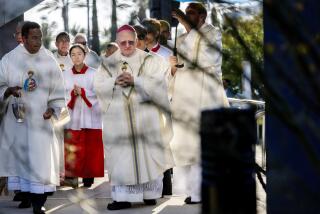Finding Christian Solutions to Disputes : Mediation: Service draws upon Scriptures to resolve confrontations that might otherwise reach the courts. Finding what party was wronged is often secondary to the spiritual rebuilding of relationships.
- Share via
A disgruntled client blames his former accountant for a $20,000 investment that went bad.
A mother puts her newborn daughter up for adoption, changes her mind, then battles to recover the child from the adoptive family.
A church elder and his neighbor are feuding because the neighbor’s dog keeps barking at night.
This is a sampling of the kinds of civil disputes that land on the doorstep of the Christian Conciliation Service, a national organization that tries to resolve confrontations that might otherwise wind up in court.
It is like other legal mediation services that have been cropping up nationwide in response to an overtaxed judicial system, but with one big difference: CCS draws upon the Scriptures to help settle conflicts between Christians.
“First Corinthians says why take your disputes before the nonbeliever instead of the righteous?” said Kimberly Parker, executive director of the organization’s Anaheim chapter. “Our mission is to keep the church unified and not air our struggles in a public place.”
The conciliation service is available throughout Southern California.
During a Christian conciliation, adversaries read biblical passages that stress loving and forgiveness. They pray and memorize verses such as Ephesians 4:32: “And be kind to one another, tenderhearted, forgiving one another, as God in Christ forgave you.”
Here, getting down to the nitty-gritty of who was wronged--or who gets the money--is secondary to the spiritual rebuilding of shattered relationships.
“The thing that’s so exciting about Christian conciliation is that many times, people come out friendly with each other and decide that whatever they were fighting about in the first place wasn’t that important,” said Brad Jacob, executive director of the Christian Legal Society, which founded the service more than a decade ago.
“That can never happen in litigation where one party wins--usually the lawyers--and the parties are forever hostile to each other,” Jacob said. His Virginia-based organization is made up of Christian lawyers, jurists and other professionals working toward integrating their personal faith and professional lives.
For a $250 fee per injured party, CCS volunteers will act as go-betweens in a variety of civil disputes.
“Right now, most of our cases are marital disputes. But we do business disputes, breach of contract, landlord-tenant conflicts,” Parker said. “We do just about anything that is handled in civil court.”
Parker describes the nonprofit organization as a “stretcher bearer” ministry--a reference to a story from the Bible about a paralyzed man whose friends put him on a stretcher and lowered him through a hole in the roof of a building so he could see Jesus.
“Because of his faith, Jesus said he was healed, but I think he meant the faith of his friends,” Parker said. “A lot of people come in here paralyzed with anger and we are like the friends in the Book of Mark who carry the stretcher.”
The mediation process begins when someone with a grievance is referred to CCS, often by a pastor or another church member. A telephone interview with the complainant is used to weed out cases with possible criminal allegations. Those people are advised to report the matter to law enforcement.
Next, a case manager sets up an interview. The person is advised that by undergoing mediation, the parties will surrender some of their legal rights. For instance, a person would lose the right to sue if the statute of limitations expired during the course of mediation proceedings. Furthermore, agreements worked out through mediation can be broken, but if the dispute goes into the final step of arbitration, that decision is legally binding and enforceable by court order.
Applicants must obtain permission from their pastors before CCS will accept a case, “since the authority of Christ and the church is the foundation of this ministry,” explains a brochure for perspective applicants. Both parties also must agree to keep their settlement confidential.
Mediators come from the local evangelical community. They include clergy members, accountants, lawyers and others.
Raymon Raugust, a Santa Ana accountant who is president of the organization, was a party to two disputes--once as a member of a church board, then as an individual.
According to Raugust, the latter case involved a former client who was a repairman looking for work. Raugust said he referred the man to business acquaintances who marketed solar equipment and needed someone to install the devices.
Later, Raugust said, he learned that the man had invested $20,000 in the business, and when the company failed, he lost the money. Raugust said he never advised his client to invest in the project but the man blamed him for his loss and asked Raugust to go through Christian mediation.
“After biblical training and reconciliation, we got up to this attorney’s office--and I said, ‘What is it that you have against me?’ ” Raugust said, describing the incident that occurred three years ago. “The upshot of it was that he felt that I should have expressed my regrets over the financial loss they had sustained. I’m sure glad he went to CCS rather than visiting his local attorney.”
Legal experts say alternate dispute resolution centers such as CCS often result in a brand of justice that is faster and cheaper.
“A lot of time is spent sitting around a courthouse waiting for a courtroom to open, finding out there isn’t one, then having to come back a few months later,” said South Orange Municipal Court Commissioner Matthew Flynn. “A lot of attorneys are charging $175 an hour and that’s a lot of money to pay for someone warming their rear end on a bench.”
However, he cautioned that for the system to work, mediators must have a working knowledge of the law. He says basic legal principles should never be abandoned purely for the sake of conciliation.
“In a divorce, for instance, you have some people who are ridden with guilt and they want to give away the whole store,” Flynn said. “You have to have someone saying, ‘Wait a minute, half the store is yours.’ ”
However, CCS officials maintain it is in matters involving family disputes where Christian conciliation often proves most effective.
In one case several years ago, a woman gave up her newborn daughter for adoption, changed her mind a few days later, then tried to recover the child. The adoptive parents, one of whom was related to her pastor, took the child from state to state when the woman initiated legal proceedings.
After 12 years, the parties agreed to Christian conciliation, Parker said. “The mediation went on for about a week. In the end, the natural parents decided it would be better for the child to stay with the adoptive parents because it would be too traumatic for her to change her home.”
Mediators also see their share of trivial matters.
A few months ago, a church elder contacted CCS to resolve a dispute over his neighbor’s barking dog. “It got to be quite heated,” Parker said. “We mailed out Bible studies and we have not heard from them since.”
Orange County Bar Assn. President Andrew Guilford describes the religious approach as unusual.
“But I think it’s an acceptable service to offer people who want it,” he said. “For some people, it is really important to abide by Christian principles when resolving disputes.”
More to Read
Sign up for Essential California
The most important California stories and recommendations in your inbox every morning.
You may occasionally receive promotional content from the Los Angeles Times.













